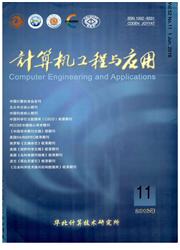

 中文摘要:
中文摘要:
计算机视觉领域,多结构模型参数的提取是一个常见任务。传统的提取算法一般先对输入数据集进行分类,然后通过对相关数据类的拟合获得对模型集参数的估计。然而,由于模型集未知,对如何实现数据集的准确划分一直是一个难点。针对这个问题,借鉴免疫系统识别抗原产生抗体的工作机理,提出了一种启发式的鲁棒回归分析方法。该方法将数据集的分类过程设计成一个逐步精确化的逼近过程:先通过随机抽样模型对数据集进行粗略划分,然后利用单模型鲁棒回归方法对各数据类中的优势数据进行尝试建模,以获得更好的模型估计。接着以此模型为基础重新对数据集进行划分,以提高分类的准确性。通过这种“分类”、“提纯”、“再分类”、“再提纯”的反复尝试,逐步逼近准确的数据类划分,同时得到模型集的准确解。仿真结果表明,该方法计算时间少,数据分类准确率高,具有较强的多结构模型参数提取能力。
 英文摘要:
英文摘要:
In computer vision domain, multi-structure model fitting is a common task. In convention algorithm, the input data set is first classified into several categories, and then the parameters of models are obtained by regression analysis of these categories of the data set. However, because the models are unknown, how to classify the input data set is still a tough task. In order to tackle this problem, mimicking the principle of antigen recognition and antibody generation of immune system, a heuristic robust multi-structure fitting algorithm is proposed in this paper. According to the algorithm,the process of data set classification is designed as an approximation process through correction step by step: firstly rough classifying the data set according to a coarse model through randomly sampling, then fitting the dominant data in each categories by convention robust regression algorithm for single model fitting, and then classifying the input data set again with the new model set to improve the classification. Through repeating the process of“classifying+fitting+classifying again + fitting again”, it approaches the precise classification and model set simultaneously. Simulations are conducted.The results show the algorithm has strong data classification and multi-structure model fitting capability with high computing efficiency.
 同期刊论文项目
同期刊论文项目
 同项目期刊论文
同项目期刊论文
 期刊信息
期刊信息
